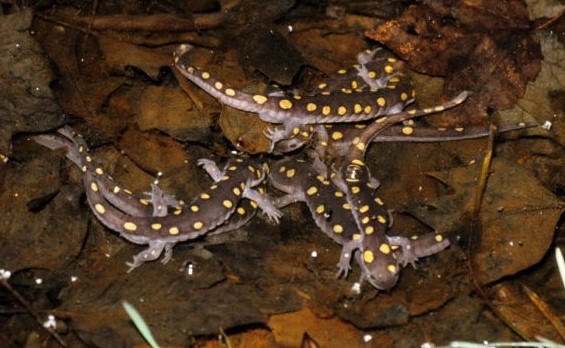Vernal pools are shallow depressions in the ground that usually fill with water for only part of the year. Melting snow and spring rains fill the holes with water, creating essential breeding habitat for specific species of frogs and salamanders. These amphibians leave their winter hibernation in the woodlands, find a vernal pool, mate, and lay their eggs in the water, leaving their young to hatch and grow in the pool. As the seasonal rains dry up, so do the vernal pools, sending the new generation of amphibians into the forest until their next breeding cycle.
Amphibians such as wood frogs, spring peepers, toads, spotted salamanders, and other woodland salamanders are popular residents in our local vernal pools. Their egg masses suspended in the water may be visible, too, with the baby salamander efts or tiniest tadpoles writhing inside. With 700 species in the Northeast relying on vernal pools, the loss of pools due to development is of major concern, and preserving the few that remain is critical. With fewer pools, we see a decrease in biodiversity, and a decline in the amount of food available for other animals that live in these areas, such as small carnivores.
To predict the best date to visit vernal pools, we need to consider two important factors, rainfall amounts and air temperature. These two must align for success: the amount of rainfall has to be significant enough to create the pool and the air temperature warm enough to tempt the amphibians out of hibernation.
To protect this unique environment, strict guidelines must be followed by all in attendance. Our presence cannot disturb or harm the wildlife or the vernal pool. Participants will not be allowed to enter the water at any time. Our team of volunteers will be gathering specimens gently and placing them in aquariums for us to observe. Your ability to listen and follow directions from the team is mandatory.
Difficulty: Easy walk as the vernal pool is close to the road.
Remember to
- Dress according to the weather. Layers of clothing work best.
- Wear sturdy closed-toe hiking or athletic shoes with non-slip soles that can safely handle slippery surfaces and can get muddy. No open-toed shoes.
- Bring a headlamp or flashlight.
- Bring a hand lens or loupe. Both are available to borrow.
- No pets, please.
- Our meeting location can be found in your registration confirmation email when payment is complete.
NEW – Payment and Cancellation Policy: Payment is due online at the time of registration. Cancellations made seven or more days in advance of the event will receive a refund minus a 5% processing fee. Cancellations made within seven days of the event will not receive a refund. NHSM retains the right to update or change these requirements at any time.
For questions, please email Jayne at JAsh@marylandnature.org.

